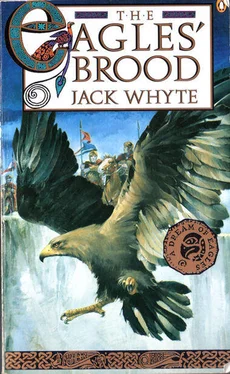Uther was quicker than I to answer. "A hill is easier to defend than a ridge—against us, anyway."
"Why?" Titus was deadly serious, not a note of condescension in his tone.
"Because our horses can attack along the ridge better than they can from below."
"Good man. So we had one problem solved. Caius, what was our other problem?"
I thought hard, just to be sure that my first reaction had been the right one. "The marsh. If it was too wet, you wouldn't be able to cross it."
"For what purpose? You're right, but why would we want to cross the marsh?"
'To get to the bottom of the hill, to get the Saxons to come down against you and take their attention away from the ridge and our cavalry."
His eyes went wide with mock admiration. "Splendid! You should make a great general some day, my lad."
"Not as great as his father," Uther grumbled, ill-naturedly, I thought, until he went on, "He hasn't got the legions."
Titus grinned. "Well, perhaps not, but neither does his father now, yet what he planned, and the way he made it work, was brilliant. It was more than that; it was sheer, absolute genius."
He shifted to a more comfortable position on his log and threw some more wood onto the fire, watching it catch and blaze until I had to ask, in an agony of frustration, "What did he do, Titus?"
"Forgive me," he grinned, "I was remembering. We watched from the woods for an hour or so and then fell back to where we had set up camp, about two miles back in a valley that was secure. Ullic's people spent the rest of that day and night making their own preparations. About an hour after it got dark, your father dispatched me with a dozen men down into the valley to test the firmness of the ground. Remember, it had been raining hard for days."
"How did you test it?" I asked.
"By walking on it. Is there a better way?"
"But didn't anyone see you?"
"In the dark? Remember our cloaks are black."
"But white inside."
"Not all of them. Only the officers'. I exchanged mine with a trooper. We blackened our faces, went barefoot, and crossed the entire valley floor to the bottom of the ridge."
"And?"
"The ground was wet, but firm. Our eyes were used to the darkness and we had no trouble. We went back to camp and I made my report. Then it started to rain, and it poured without let-up for the rest of the night, thunder and lightning frightening the horses, and everything glopped up with mud and impossible to fight in. We had planned to attack at dawn, but it was hopeless. We had to sit tight in our hidden camp and wait for the weather."
"How long did you have to wait?" This was Uther, as avid for details as I was.
"Only a day. The clouds broke up in the middle of the morning and the sun blazed for the rest of the day. Late again that afternoon, the General, Uric, King Ullic and I went back to the wood on the valley side. Our timing was perfect. We had estimated about eighty men in the enemy camp the day before, but no sooner had we got into position in the woods that second day than we saw a large party—at least a hundred men—approaching from the east. They had obviously been raiding. They had loaded wagons with them, and lines of women, all tied together. We watched them climb the hill and enter, the camp, and we stayed to watch the celebrations that started immediately afterward. We were glad we had waited, for we knew there would be a lot of thick, aching heads in that camp, come morning."
"So? What happened next?" I was growing more and more impatient of his introspective pauses.
"Oh.. .We returned to camp and reviewed our plans, and then we slept for a few hours. Then, just before midnight, General Picus left with his cavalry, to make a great, circular sweep that would position them on the ridge to the west of the stronghold well before dawn. He had sent out scouts the night before to mark their way while I was down in the valley with my men."
He glanced at Uther. "Two hours later, King Ullic and your father, Uric, left with their bowmen, and shortly after that the others left, leaving me with a reserve of twenty mounted men, to take my place on the hillside we had been using as an observation post. And after that, it was simply a matter of waiting for daylight." Titus chuckled aloud and shook his head.
"What are you laughing at?" I asked him.
"Oh, I was just remembering. I've never seen anything so beautiful, and I had the best view, among all the people there. It was truly magnificent." He shook his head again, grinning.
"Well?" Uther sounded as impatient as I was. 'Tell us!"
"All right. What happened eight years ago and then again two years ago that all the Saxons know about?"
"The legions left."
"Correct. The legions left. So, imagine dawn on a summer morning, just as the birds begin to sing, and here's a camp of Saxon raiders, safe behind walls of stone on the top of a hill, and suddenly there's a sound in the distance that they don't expect, or want, to hear—a drumbeat. And along the valley comes a sight that none of them had ever thought to see again in Britain. A troop of Roman soldiers. Legionaries, marching in full armour, shields and spears and cloaks and helmets, three centurions on horseback at their head. A full maniple, a hundred and ten men, marching along the valley. Suddenly the trumpeter blasts a call and they all break into double time. I'll wager my best parade armour there wasn't a single Saxon still asleep within three minutes of the sound of that first drumbeat.
"But then, unexpectedly, and suddenly, the senior centurion notices the camp on the hill and gives the command to stop. Everything stops. The soldiers are almost at the bottom of the hill. The centurion sends a trooper forward to survey the camp. Most of the Saxons are hidden along the walls. The trooper approaches, hesitates, goes forward again, stops, sees something suspicious and turns to wave his maniple away. As he does so, someone in the camp fires an arrow at him. It misses, and he begins to run back down the hill. The senior centurion shouts a command, his men turn around, and he begins to double time them back the way they came. Romans, running away!
"Those Saxons came over their walls and down that hillside in a solid wave, along the entire length of it, and the Roman retreat broke into a rout, the legionaries running as fast as their legs would carry them, out into the marshes.
And as they ran, the Saxons followed them, right down the pathway they had taken between two lines of bowmen who lay hidden beneath the covers they had made for themselves from grass and rushes two nights before. When the legionaries had run far enough, the trumpet sounded again and the bowmen threw off their covers and stood up for the slaughter. The Saxons were caught between two lines of them, twenty-seven on each side. The Celts were firing as fast as they could draw their bows and the closest Saxon to any of them had to run fifty paces into their fire before he could engage."
Uther and I were spellbound.
"In the meantime," Titus went on, "the cavalry had begun their attack along the ridge as soon as the enemy was committed to chasing the running legionaries. They had no opposition. Took the place on the first charge and didn't lose a man.
"The trumpet call that brought the bowmen out was also the signal for the maniple to reform. By the time the bowmen began to run low on arrows, the Saxons who were left had a perfectly disciplined diamond infantry formation coming down their throats. They ran, back to their camp, until they saw our horsemen on the hilltop. After that, those that still kept their senses could only run towards my position, through the hole that the bowmen had conveniently left open for them on one side. There were no more than thirty of them left when I broke cover with my squadron and went to clean them up. I didn't even bloody my sword."
Читать дальше









